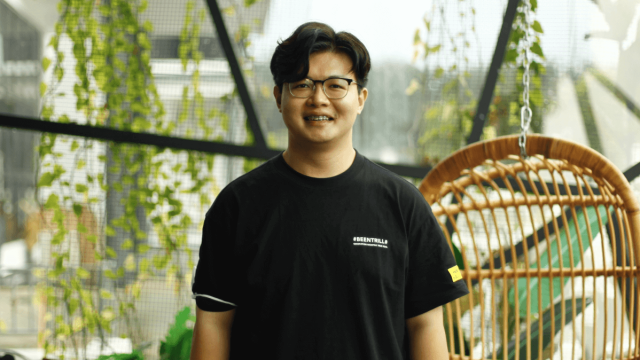
Transforming PTSD Care: Savyn’s Neuroscience-Based Platform and its Impact on Mental Health
Nicholas Yap partnered with Savyn to make PTSD care more accessible in Singapore and by extension, Asia. Originally from Canada, the platform aims to serve people without immediate access to a therapist. Having secured a finalist spot in the Lee Kuan Yew Global Business Plan Competition (LKYGBPC) organised by SMU Institute of Innovation & Entrepreneurship (IIE), Nicholas shares how he plans to expand the platform in Asia.
Post-traumatic stress disorder (PTSD), a profoundly disruptive mental health condition, can cast its shadow over multiple facets of one’s life. When triggered, the human body is propelled into a primitive fight or flight mode – an ordeal that has often been described to be exceptionally debilitating.
Savyn – a groundbreaking platform started in Canada – aims to alleviate these symptoms through neuroscience-based digital therapies. Nicholas Yap, a final year SMU student majoring in Strategic Management at the Lee Kong Chian School of Business, has partnered with the platform to help implement this start-up successfully in Singapore and by extension, Asia.
Initially presented with a unique opportunity by Canadian co-founders Sakeena Mihar and Vic Shao-Chih Chiang through LinkedIn, Nicholas discovered an instant resonance with the team’s work in the mental health space. Drawn by his track record in diverse business-plan-case competitions (most notably the SMU FinTech x M-DAQ case competition where his team clinched finalist position) and his active involvement in the social sector, the team brought Nicholas on board as Savyn’s Chief Operating Officer to spearhead its foray into the Singapore market.
“Navigating a new market isn’t just about understanding its nuances; it’s about truly immersing oneself in its culture, its values, and its demands. As I delved deeper into market analysis, landscape research, and prospective execution strategies, I became increasingly convinced of the value Savyn could bring to Singapore and, subsequently, Asia,” says Nicholas, reflecting on his journey with Savyn so far.
His pragmatic ingenuity and the Savyn proposition have secured for the start-up a coveted finalist spot in the Human Health and Potential category of the distinguished Lee Kuan Yew Global Business Plan Competition (LKYGBPC), a biennial university start-up challenge in Singapore organised by the Institute of Innovation & Entrepreneurship (IIE) at SMU.
The visionary platform and its take on digital therapy have already attracted global attention, with ongoing trials in prominent medical institutions across Canada. As the company’s beta product, SavynCares, made its debut in April 2023, amassing an impressive 40,000 visits to date, we delve into Nicholas’s insights and his aspirations for the company’s future.
Making PTSD symptom management accessible
A PTSD reaction is involuntary, making its prevention and management a daunting challenge. Through the emulation of clinically proven PTSD therapies designed to manage panic attacks, triggers, and other trauma symptoms, Savyn seeks to offer comfort and relief to those without immediate access to a therapist. In this manner, the platform strives to streamline and enhance the accessibility of PTSD symptom management.
The platform currently guides users through a variety of therapies, such as breathing exercises using the box-breathing technique (which helps to calm them), as well as provide digital resources that help the user understand more about trauma and how they can identify their own triggers.

A PTSD reaction is involuntary, making its prevention and management a daunting challenge.
The platform is also actively exploring the integration of innovative features, including Eye Movement Desensitisation and Reprocessing (EMDR). This technique employs guided eye-motion therapy, where individuals with PTSD narrate distress-inducing situations while undergoing therapy.
“Over 1,000 patients have utilised the platform since initiation, reporting significant reductions in the intensity of their PTSD symptoms,” says Nicholas. “Clinicians also observed a 40 percent reduction in acute PTSD episodes among patients who regularly used our breathing exercises. EDMR therapy has also shown promise in early evaluations.”
Undoubtedly, one of the platform’s standout features lies in its comprehensive multilingual support. This aspect of the service is especially valuable for individuals in the immigrant and refugee communities who may struggle to find the support they need in a timely manner.
Challenges in implementation and future aspirations
Expectedly, the efficacy of melding a digital platform with conventional PTSD therapy raised scepticism among medical professionals. To cultivate trust and garner acceptance, Savyn organised a series of training sessions and workshops for medical experts to showcase the scientific foundations underpinning the techniques used on its platform.
Maintaining accessibility, particularly for patients less familiar with technology, was an important focus for Nicholas and the Savyn team. Multiple iterations, enriched by invaluable user feedback, helped the team achieve its current implementation.
Savyn’s ambition to serve diverse populations also introduced the intricate challenge of navigating around cultural nuances. To get around this, the team astutely enlisted cultural advisors to ensure their content was relevant across different cultures.

Nicholas credits the influence of his SMU Professor Koh Hock Tee, whose “Leading New Ventures to Growth” module has been integral in shaping his approach to formulating business expansion plans.
As the Savyn team sets its sights on the Asian markets, with Singapore as the primary entry point, Nicholas plans to capitalise on the opportunity provided by the LKYGBPC. His aim is to accelerate collaborative efforts with local institutions within the mental health domain.
“One of our first steps is to ensure that our outreach efforts are relevant to the local market. We will also need to check on implementation feasibility to establish a presence in Singapore,” states Nicholas.
Nicholas credits the influence of his SMU Professor Koh Hock Tee, whose “Leading New Ventures to Growth” module has been integral in shaping his approach to formulating business expansion plans.
“The module enabled me to carefully weigh Savyn’s dynamic and distinctive company culture alongside the prevailing cultural norms here when devising our expansion into the Singapore market.”
Opening doors in mental healthcare
Savyn’s mission to simplify and make PTSD care accessible aligns well with the LKYGBPC’s theme of “Innovations Beyond Boundaries”. Constraints of conventional therapy, such as geographical distances or language barriers, are tactfully countered by Savyn’s multilingual platform.
“Savyn can significantly enhance therapy accessibility for those residing in remote or underserved areas. Our digital platform also has the capacity to reach a much larger demographic to bridge the gap in mental health resources,” emphasises Nicholas.
To Nicholas, Savyn’s securing of a coveted finalist spot in the LKYGBPC is an affirmation of the importance of its work. “Being recognised for pioneering work, especially in a field as crucial as Human Health and Potential, is a testament to the value and impact of our work. With the escalating prevalence of mental health concerns in Singapore, I believe that this area of focus is crucial as the society progresses.”
Savyn is a finalist in the Human Health and Potential category of the 11th Lee Kuan Yew Global Business Plan Competition (LKYGBPC), a biennial university start-up challenge organised by the SMU Institute of Innovation & Entrepreneurship (IIE).



